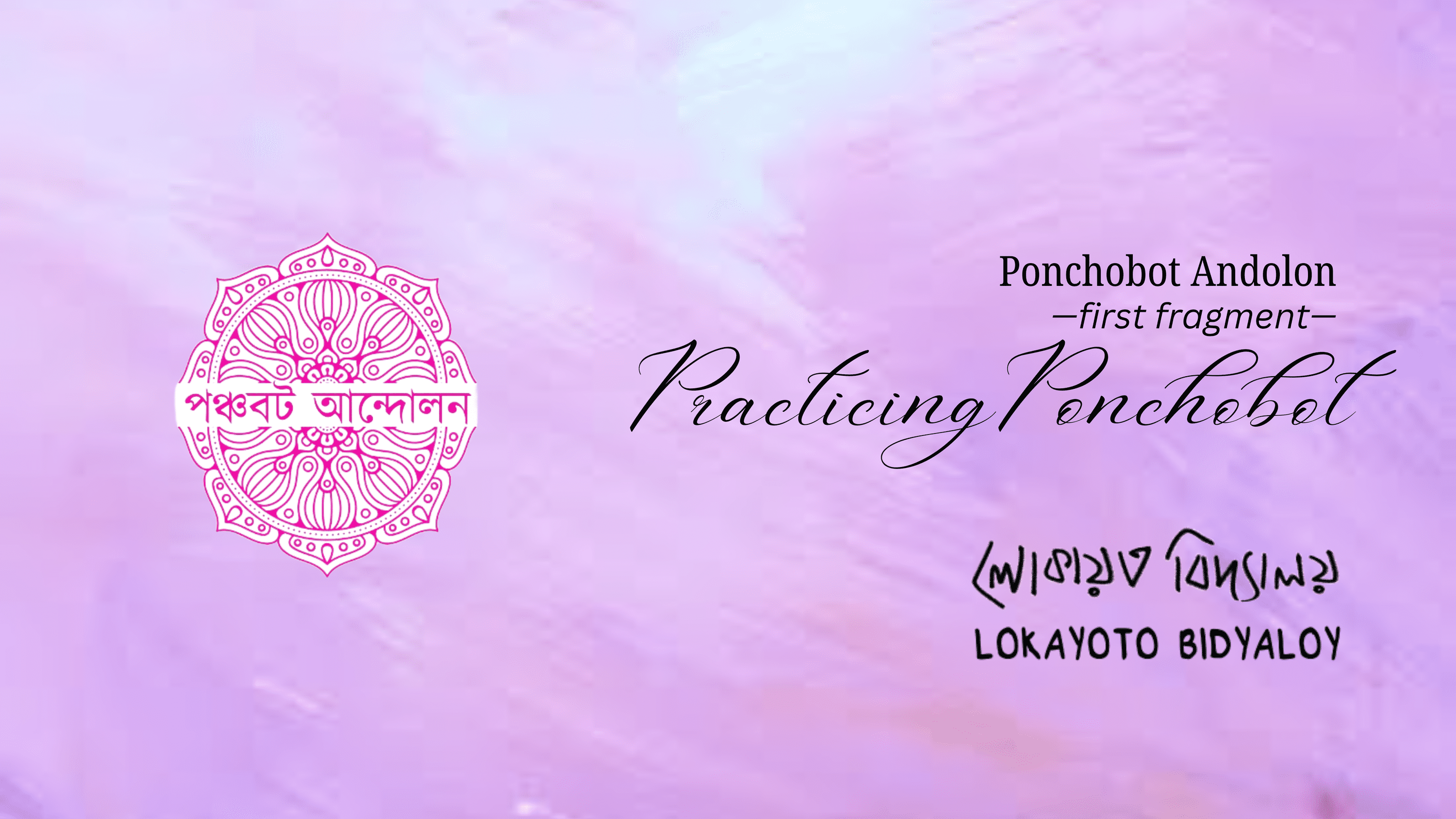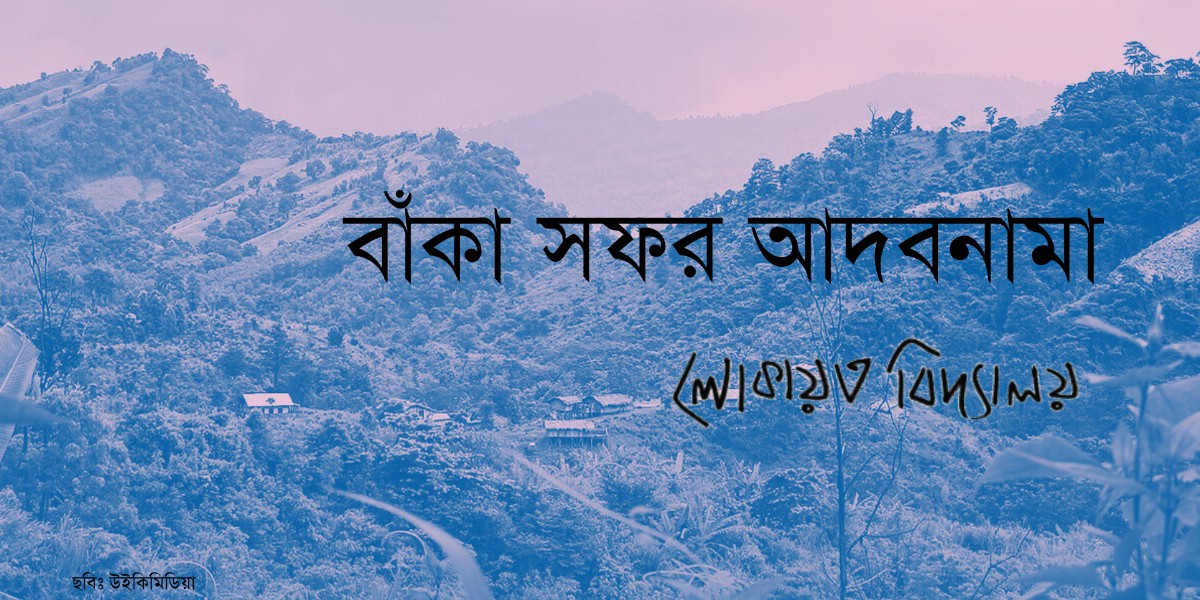
বাঁকা সফর আদবনামা
October 12, 2024In the traditional placemaking practices of the Bengal Delta and surrounding regions, five trees are planted in five directions around settlements, townships, akhras, khankas, dargahs, ashroms, or any other perimeter/construction. Oshth/Aswattha (Peepal) in the east, Bot (Banyan) in the west, Bel (Bengal quince) in the north, Amloki (Indian gooseberry) in the south, and Ishan/Oshok (Ashok) in the south-east.
Although many acknowledge the five trees and their directional placement as traditional ecological knowledge, the ponchobot practice in our understanding is not timeless. We hold that the five trees and their directions may change depending on time and place.
We may need to respond to land-based priorities and situated considerations in our ponchobot praxis. For example, it is now urgent to plant palm trees in different regions of Bangladesh to protect against more frequent lightning storms under climate colonialism. We need to prioritize specific species and their vitality, i.e. we need to reconfigure nature-human relations in response to the particularities of different bioregions composed of settlements, rivers, beels, mountains, sea, or plain areas.
The Ponchobot Andolon is not just a matter of planting conventional ponchobot (the five trees) and ignoring the rest of our plant relatives. It is certainly not about reducing planetary problems to simplistic interventions such as planting trees. Rather, Ponchobot Andolon advances a practice that acknowledges and honors species and life-making that are invisibilized and minimized in dominant lifeways and settlement patterns. Ponchobot Andolon takes into account webs of relations among all species and moves beyond binaries of living vs non-living, and beyond hierarchical thinking where species are arranged vertically. We understand that ponchobot practitioners will establish relationships (or not) with species according to their social-ecological specificities. For ponchobot practice it is necessary to be care-full, and offer respect and dignity to all interbeing relationships. Practitioners have to continue interrogating their thinking and practices around ossified concepts such as inanimate objects, living beings, and humans. Ponchobot Andolon questions the racist-colonial-patriarchal ideologies that underpin the false separations between living vs non-living, matter vs spirit, wild nature vs human culture etc.
The reasonableness of ponchobot practice cannot be evaluated within anthropocentric thinking and utilitarian or pragmatic calculations. Ponchobot practice is not about promoting tree shade, growing desired exotic or native flowers, appreciating the beauty of nature, conserving forest land, restoring degraded soil or saving threatened wildlife. Instead, ponchobot practice aims to rewrite, transform, and create novel interbeing and interspecies relationships beyond anthropocentrism, human exceptionalism, patriarchal supremacy, and progressive humanism towards a collective sacred well-being.
A tree or an insect or a bird or a fungus or an earthworm or a bacterium is an interbeing, i.e. an interspecies assemblage living in multispecies worlds. A stone, a river, a beel are interbeing relations. Humans, too. The relationships among living, inanimate, metal, non-metal, humans and more-than-humans are all interbeing relations.
The planet is an interbeing.
Planetary interbeing refers to the systems and networks that co-constitute the planet through intricate and intimate relationships. The Ponchobot Andolon proposes an understanding and practice rooted in these relationships, reciprocities, and ungraspable totality that transgress the boundaries of humanism, anthropocentrism, human exceptionalism, and saviorism.
Ponchobot Andolon invites us to enter into an interbeing meditation.
This is why Ponchobot Andolon is not a tree-planting initiative or conventional environmentalist movement. Ponchobot Andolon is not about tacitly benefiting land and house owners through conservation efforts. Instead, Ponchobot Andolon takes a critical stance towards the limitations, problems, and crises of dominant concepts and frameworks of human and environment relationships. Ponchobot Andolon is a movement to transform our modes of living and dying, ways of existing in embodied relationships, and reimagining practices of transformation.
Ponchobot practice concerns everyone.
Racist colonial modernity, capitalism, patriarchy, identitarianism, statism, borders and frontierism, techno-fix fantasies, green colonialism, development models, growth obsession, high productivity, modern agriculture, western environmentalism, social forestry, carbon tunnel vision, nature-based solutions, ecosystem services, humanism and human exceptionalism, naturalism, cultural essentialism etc. have undermined dignified interbeing and interspecies relations. These intersecting assemblages of care-lessness disrupted the continuity of our collective wisdom about interbeing relations. It is now necessary to pay attention to our intergenerational and transborder wounds and harms. We need an anti-racist, anti-patriarchal, decolonial action-reflection to nourish the emergence of new wisdom and practices rooted in the interbeing fabric of life, all life, humans and more-than-humans.
- Ponchobot Andolon Collective. Bangladesh. English Version : October, 2024.


